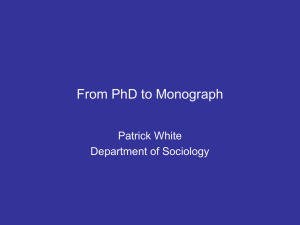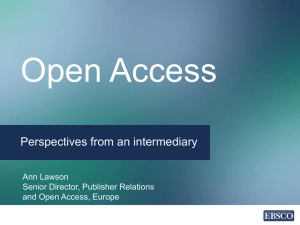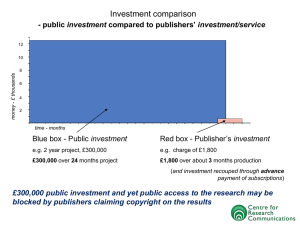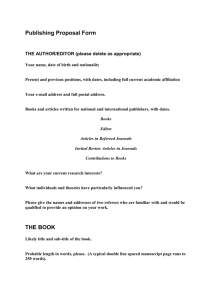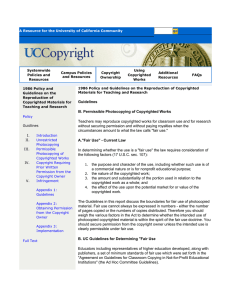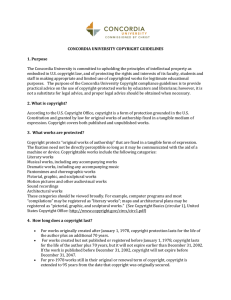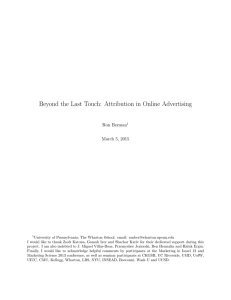Rev: February 10, 2012 Subj: COPYRIGHT GUIDELINES Guidelines:
advertisement
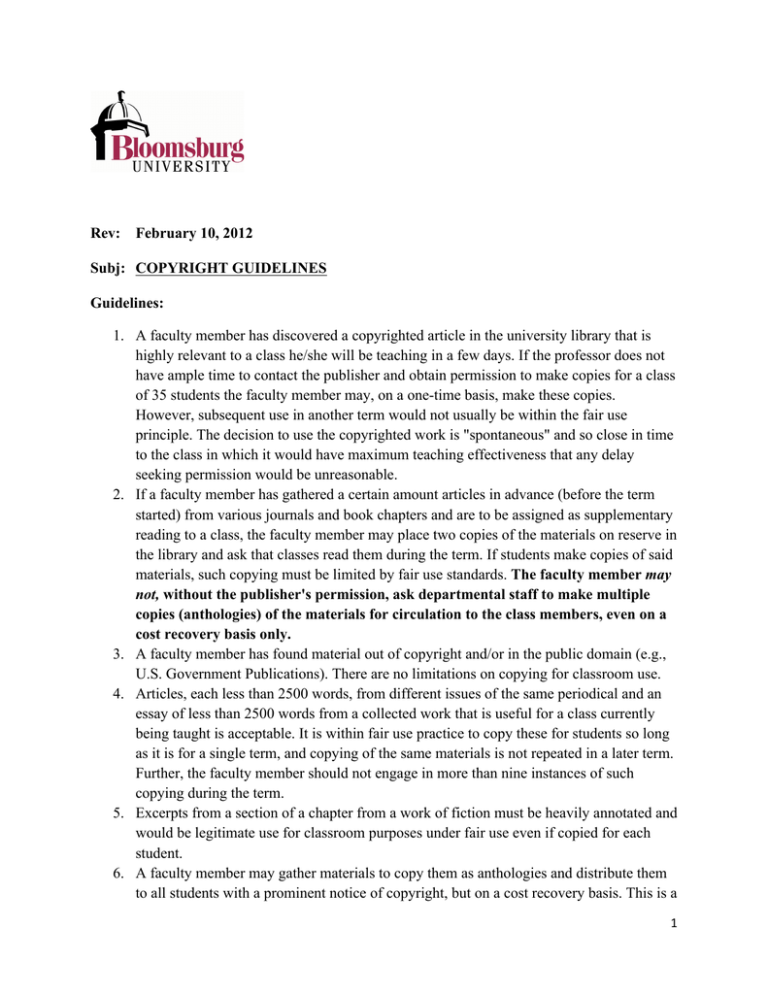
Rev: February 10, 2012 Subj: COPYRIGHT GUIDELINES Guidelines: 1. A faculty member has discovered a copyrighted article in the university library that is highly relevant to a class he/she will be teaching in a few days. If the professor does not have ample time to contact the publisher and obtain permission to make copies for a class of 35 students the faculty member may, on a one-time basis, make these copies. However, subsequent use in another term would not usually be within the fair use principle. The decision to use the copyrighted work is "spontaneous" and so close in time to the class in which it would have maximum teaching effectiveness that any delay seeking permission would be unreasonable. 2. If a faculty member has gathered a certain amount articles in advance (before the term started) from various journals and book chapters and are to be assigned as supplementary reading to a class, the faculty member may place two copies of the materials on reserve in the library and ask that classes read them during the term. If students make copies of said materials, such copying must be limited by fair use standards. The faculty member may not, without the publisher's permission, ask departmental staff to make multiple copies (anthologies) of the materials for circulation to the class members, even on a cost recovery basis only. 3. A faculty member has found material out of copyright and/or in the public domain (e.g., U.S. Government Publications). There are no limitations on copying for classroom use. 4. Articles, each less than 2500 words, from different issues of the same periodical and an essay of less than 2500 words from a collected work that is useful for a class currently being taught is acceptable. It is within fair use practice to copy these for students so long as it is for a single term, and copying of the same materials is not repeated in a later term. Further, the faculty member should not engage in more than nine instances of such copying during the term. 5. Excerpts from a section of a chapter from a work of fiction must be heavily annotated and would be legitimate use for classroom purposes under fair use even if copied for each student. 6. A faculty member may gather materials to copy them as anthologies and distribute them to all students with a prominent notice of copyright, but on a cost recovery basis. This is a 1 perfectly legal use of copyrighted materials, so long as permission has been obtained in writing from the publishers for use of the materials and the faculty member has adhered strictly to the requirements of the publisher. Allowances: 1. The copyright holder explicitly releases the published materials from strict observance of the law. Frequently publishers, particularly association and scholarly publishers will exempt educational uses of their materials from strict observance of the copyright law. Exemptions must be stated within the published materials. In such cases, it is permissible to copy the materials without permission or recompense, up to and including the limits set by the publishers, even when they exceed fair use requirements. On the other hand, a publisher may not claim rights in published materials which exceed those established under law. Though such claims may be made, faculty are under no legal obligation to follow them. 2. The faculty member has obtained the right to use the materials in writing from the copyright holder who has explicitly released them for stated classroom or research purposes. Notwithstanding the limitations of the law, publishers generally have established copyright clearance offices and standard practices to allow for educational uses in excess of legal limitations. Frequently, publishers will not ask for payment and all that is required is a written request for permission to use materials for classroom purposes. For Coursepacks: 1. Copying can be done for only 10% of a book 2. If a book is over 75 years old, it is fair use and can be copied as much as needed 3. If coping journal articles, permissible to include one article per journal issue- if more than one article, must go through copyright clearance procedures. 2

